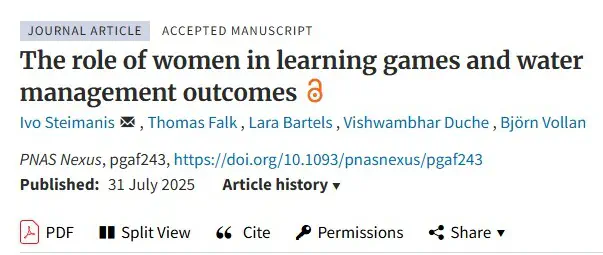
Abstract
Economic games have emerged as promising tools for fostering sustainable resource management, yet their gender dynamics remain underexplored. We examine how women’s participation relates to the effectiveness of game-based learning in 56 Indian communities facing water management challenges. These structured experiential learning environments allow participants to develop system understanding, problem-solving capacities, and collective action through active engagement. Our results suggest that greater female involvement is associated with improved water management outcomes two years after the intervention. Notably, the presence of female leaders correlated with broader participation among women, which in turn was linked to the development of more effective management rules. These findings indicate that gender-balanced participation may enhance the success of such interventions. Incorporating women in game-based learning has the potential to support long-term improvements in resource management, highlighting the importance of inclusive approaches.